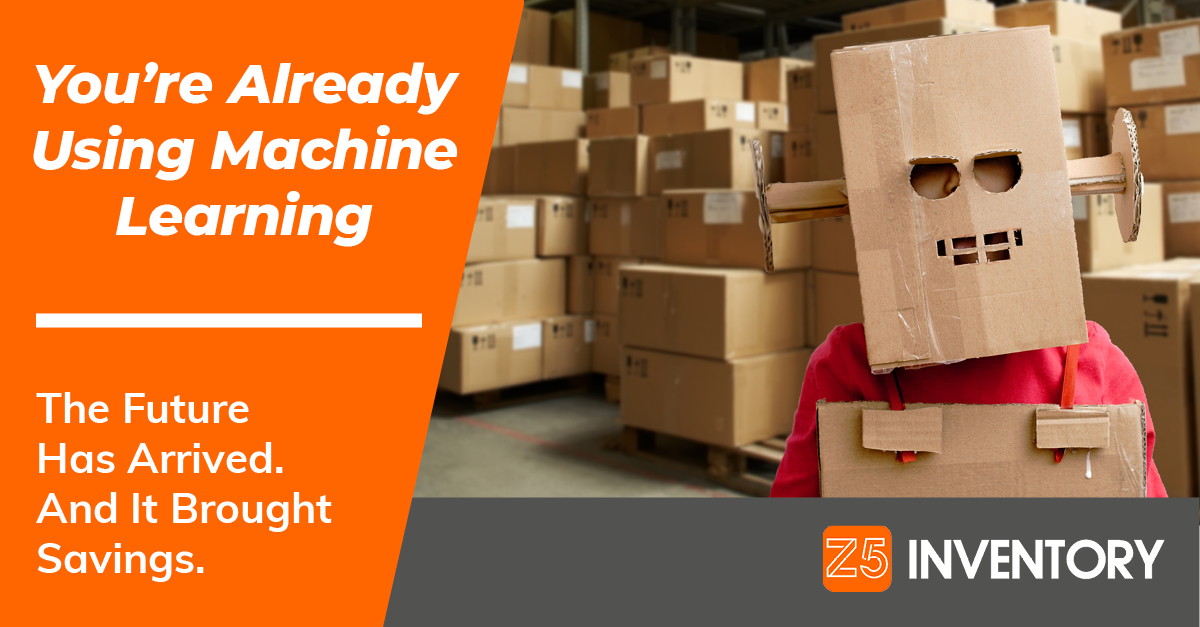How Machine Learning Is Already Improving the Supply Chain

We’ve seen a lot of articles talking about what machine learning can do for healthcare’s supply chain. But we’re more interested in what it’s already doing.
Because AI and machine learning are utilized so often, you probably don’t realize all the ways you're encountering it. There are invisible uses, like your phone recognizing your face, and there are more deliberate uses, like how Z5 Inventory analyzes and predicts ordering medical supplies.
But let’s get some groundwork established before we get into that.
What Is AI?
Other than what every writer predicts will be the end of human civilization? Artificial Intelligence is a way of getting computers to analyze data and come to some conclusion, much the way the human mind works.
There are two types of AI: the general type mimicking human intelligence, and the narrow type that you can get to solve specific problems. The first kind doesn’t currently exist, but the latter kind is already in use in your everyday life.
Your phone can reasonably predict when you should leave to get somewhere on time, because it can access the current density of traffic, analyze its flow, and guess how quickly you could move through it.
How Do We Use It In Healthcare?
AI is experiencing an upsurge in healthcare at the moment thanks to its ability to identify tumors and other diseases. Specifically, though, we’re interested in what Artificial Intelligence can do in healthcare’s supply chain.
There are many conversations about how AI can enable warehouse robots to analyze and replicate tasks like picking, packing, and shipping product. And, of course, AI is already the “driver” behind the wheel of driverless cars. But implementing Artificial Intelligence doesn’t need to be nearly that physical or – more importantly – that expensive.
When looking for practical applications of AI – ones that are being used daily, probably already in your facilities – we need look no further than machine learning.
What Is Machine Learning?
The top Google result defines machine learning as “a method of data analysis that automates analytical model building,” which is barely helpful at all. How about we define it this way: machine learning is a type of AI wherein computers use a massive amount of information to get better and better at identifying something by guessing over and over.
There are some high-profile versions of this like Google's DeepMind beating people at games. And then there are the everyday ways that machine learning is impacting your life.
Your phone is leveraging machine learning when it tries to auto-complete what you’re typing. Have you ever been on YouTube? Trick question, since you probably clicked on one of the videos above. As soon as you did, that affected what YouTube guesses you might like. (If you start getting suggestions for a lot of videos where people talk all British-y, don’t blame us.)
How Do We Use It In Healthcare?
Machine learning takes a big pile of data to work. And you know who has piles of data just lying around everywhere? Healthcare’s supply chain. Every product sitting on the shelf has a giant string of information attached. Catalog number, quantity, price, expiration date, and packing string are just a few. The description alone can include a mountain of data – brand, product line, measurements, parts or ingredients, and on and on.
And that’s just one line on one order. Every order has dozens – if not hundreds – of lines, and every inventory has thousands upon thousands.
So what can we do with this massive amount of data?
Just like the algorithm that read all the Harry Potter books and wrote its own impeccable but impenetrable chapters of Harry Potter and the Portrait of What Looked Like a Large Pile of Ash, we can get our machines to make predictions.
The practical version for us is teaching AI to track and recognize buying and consumption patterns. Through machine learning, Z5 Inventory can know when you’re likely to order products and what you’re likely to order.
What’s even more valuable is that we can use some of the same processes to optimize your ordering. You might not even realize that you order the same sutures, let them expire, then have to order them again. But you can’t fool a machine.
So What?
Well, that’s not a very good attitude. Get excited! Because AI and machine learning are ready and waiting to make procurement easier and save you money. And that goes for every company at every link in the supply chain.
One of those companies is Z5 Inventory. Take advantage of the solutions we’ve already used to save hospitals across the United States millions of dollars. Start improving your job and your life.
